- Home
- Matthew Costello
Beneath Still Waters Page 18
Beneath Still Waters Read online
Page 18
Whatever this Martin Parks claimed his credentials
might be, Wiley believed him. Tall, thin, with an angular
face that seemed all lined in edges, he looked like a man
who meant what he said.
Totally.
“So,” Parks said, “we’re looking for just a small piece of
undeveloped land, for a block of offices. A small warehouse.
168
m a t t h e w j . c o s t e l l o
Nothing too big. Just something nice and quiet for our U.S.
office. You understand.”
He was in his early forties, maybe even a bit younger,
with a tan complexion that spoke of leisurely weeks cruis-
ing the Mediterranean.
“I understand,” Wiley said, “and I’m sure that our Cham-
ber of Commerce would be more than glad to help you . . .”
Parks’s face registered disappointment.
“Oh. I was hoping you could take a personal interest in
our small proposal. You know, perhaps running interfer-
ence for us.” He smiled. “In fact, if you can help us,” he
said, reaching into his inside coat pocket, “we’d be most
appreciative.” He removed an envelope and slid it toward
Wiley.
It was fat, bulging. And he saw it wasn’t filled with
singles.
Parks’s grin broadened. “Consider it a retainer for your
‘consulting services.’ Perhaps you can use this in your”—
he paused—“upcoming campaign.”
He looked right at Parks. How could he know of his
plans? No one in town knew, certainly not a stranger. He
started to shake his head. “I . . . I don’t know.”
Parks stood up. “Call it a friendship offering. From a
new business partner.”
Wiley let his hand close around the chunky envelope.
Still confused, he blurted out, “Perhaps you’d like to come
to a dinner tomorrow night. It’s at the country club . . . for
the Kenicut Dam celebration.”
Parks nodded. “How thoughtful of you to invite me.
Why, I’d be delighted.”
“It’s a costume—”
“I know,” Parks said, interrupting. “A costume ball.”
Wiley saw Parks’s expression shift, and he wondered,
Who the hell was this guy? Some mafioso front man?
Parks took a step closer to him. “I do hope your celebra-
tion goes off smoothly,” he said. “Some of my associates
b e n e a t h s t i l l w a t e r s
169
were planning on coming to town. I’d hate to disappoint
them.”
“N-no,” Wiley said, stammering. “I’m sure there’ll
be no—”
But Parks was already moving to the door.
“I’ll see you tomorrow night, Mr. Wiley. In costume, of
course.”
He let himself out while Wiley stood there, breathing
hard . . . remembering his childhood asthma.
Playing with the big boys, he thought. That’s what this
is. Whatever business Parks is up to, it’s no good.
He walked over and shut the office door.
He opened the envelope and started counting the thick
stack of hundred-dollar bills.
“Anybody home?”
The voice startled her, carrying over the hum of her
ray-gun-shaped hair dryer. She hurried out to the living
room.
Dan was at the screen door, holding it open and sticking
his head in.
“Oh, sorry, I didn’t hear the buzzer over my dryer.”
He gave a hearty sniff. “That’s the mighty aroma of gar-
lic, if I’m not wrong. Smells good.”
“Chicken Provençal . . . from my limited repertoire of
French dishes. You’ll love it.”
He walked in, and she felt again how dangerously at-
tractive he was. And all wrong for her, she had tried to tell
herself all day. You just can’t let yourself fall for some
good-looking, interesting, and intelligent hunk.
What the situation requires is some calm, settled, and
wealthy businessman, ready to love and support her and
Claire. Dull but reliable.
Not Indiana Jones with a camera.
Except that she had left work early to come home, putting
170
m a t t h e w j . c o s t e l l o
on makeup and a new summer dress—perfect for moonlight
walks, and, of course, a knockout dinner.
“Drink?”
“Sure,” he said with a grin. “Bourbon, if you have it.”
She talked as she opened the just purchased bottle of
Jack Daniel’s. “So how’d your visit with Billy Leeper go?”
Dan had plopped down onto the couch. “Ask me tomor-
row. I’ve got the past fifty years of his life in the back of
my car.” He told her about the notebooks as she handed
him his drink. “Tonight I’ll hole up in my motel room and
see just what the old buzzard learned.”
“Eat and run, huh?”
He smiled, a big, generous grin that was light-years
away from the tight-faced looks of the long gray line of
anxious commuters trooping down to the train station in
New York. Dan Elliot certainly didn’t belong in this town.
“No, I’ll stick around a bit . . . maybe we can take a
walk after dinner.”
“I’d like that,” she said, looking right at him.
And for a moment they were both quiet.
She heard a car pull up outside.
“Oh, there’s Claire. She baby-sat today. . . .” The spell was
broken, and she felt almost relieved as she went to the door.
“Hi, honey,” she called. Claire walked up to the house
slowly. “How’d things go?”
But it took only a brief look at Claire to see that things
hadn’t gone too well. Her daughter’s face was locked,
masklike, into some fretful grimace. Lips pursed, her brow
knitted.
Obviously it hadn’t gone well at all.
“Baby, is there anything wrong?”
Claire’s entrance was punctuated only by the rude slap
of the screen door.
“Claire?”
“I don’t want to talk about it.” She looked over and saw
Dan.
b e n e a t h s t i l l w a t e r s
171
“Hi, Claire,” he said.
“Hi,” she said flatly.
Dan looked at Susan. “Perhaps I’d better go?”
Claire continued walking through the living room, past
the kitchen, down the hall to her bedroom.
“No, please,” Susan said, not very convincingly, “the din-
ner’s almost ready. She gets in these . . . snits all the time. I just— Will you excuse me just a moment, until I find out
what’s wrong?”
“Sure, go ahead.”
Susan turned from him and hurried down the hallway.
It’s always children, she thought. They come first. All
the time. Your job, your social life, everything is secondary.
And lately, with Claire’s terrible dreams growing worse,
she was beginning to worry.
Was there something really wrong, something big,
something more than just a little nightmare?
Her teachers always said she was a bit of a loner—
standoffish, lost to her books. Was there a real problem, and
wa
s it her fault? It’s the kids who pay in a divorce, that’s
what her mother always told her. And despite her best ef-
forts to be a supermom, maybe she was actually blowing it.
“Claire.” She turned the door handle to her room, but it
was locked.
“Claire, can we talk?”
“Later,” Claire said in a surprisingly firm, assured voice.
Susan debated forcing her to open to door.
“Okay, honey, we’ll talk later.”
She went out to Dan, and the dinner she no longer had
an appetite for.
Dan had eaten heartily, while Susan had simply moved her
food around, mostly munching on chunks of crusty bread,
dipping it into the garlicky wine sauce.
Twice she tried to get Claire to come out and join them,
172
m a t t h e w j . c o s t e l l o
but Claire quietly balked. She was relieved when Dan
again suggested a walk around the block.
“I’m not used to sidewalks,” he said, joking.
The sun wasn’t quite down yet, but the trees and homes
had the bluish tinge of twilight.
“We bought this house here because, well, it looked like
a good place to raise kids.”
“We . . . you mean your husband and you?”
She nodded. “We had this quaint Our Town image of
our life, a nice quiet block in suburbia. A safe place for the
me generation to raise their kids.”
“Yeah.” Dan laughed. “I tried that too. Fortunately none
of the ladies I did time with wanted to have a kid with me.”
He looked right at Susan. “Can’t figure out why, can you?”
She laughed. “I guess most of us need, I don’t know,
security, stability—”
“Go ahead, focus on my weak points.”
They turned the corner, walking past well-kept lawns.
She saw old Samuel Jones—watering his lawn in a tank
top and Bermuda shorts. He waved at her.
“So, what was your problem, Ms. Sloan?”
She took a breath. “I made the mistake of marrying
someone older. Older, wiser, and, it eventually turned out,
all wrong. He was a publisher, just divorced, and I wanted
to write. His fifteen-plus years on me didn’t seem to mat-
ter. And despite his teenage daughters, he wanted to start
another family.”
“So what happened?”
“Everything. And fast. I discovered that one of his
peccadilloes was seducing would-be authors . . . just like
he had seduced me. His weekend jaunts to book conven-
tions became a regular feature of our life together. As soon
as I was pregnant, he seemed uncomfortable with me. I
became a dull housewife, cooking meals only to be re-
heated when he came home late, growing fat with the
baby, while I knew he was still running around. Shortly
b e n e a t h s t i l l w a t e r s
173
after Claire was born, he split. Said I had become just
like his ex-wife. I was so relieved, I didn’t try to nail him.
Just support money, and the harrowing life of a single
parent.”
“Sounds like it made you grow up fast.”
“Oh, sure, there’s nothing like taking care of a kid all by
yourself to make you feel grown-up. I started writing.
Fillers for the local paper. Graduating eventually to feature
stuff, until”—she sighed—“I became the sparkly, happy,
successful person you see now.” She gave Dan her best
self-deprecating grin, scolding herself for letting herself
go all maudlin and bitter on him.
“Hey,” she said, “I’m sorry that I—”
He reached over and took her hand.
( Yes, she thought, I need that. Some assurance that I’m still human, still—)
“I should get you back so you can talk to Claire. I like
her, Susan, really like her. She doesn’t miss a trick.”
They stopped at the corner, ready to turn back. It was
dark now, time when people outside became pale, shadowy
outlines—the colorful mishmash of their summer outfits
gone.
“You’re right,” she said, looking at him.
And she leaned up, impulsively, to kiss him. His arms
went around her, powerful arms that squeezed her close.
He kissed her back, hard, and it was over.
“C’mon,” she said. “You’ve got a lot of reading to do.”
When Dan had left, and she’d gotten back to the house,
she found Claire sitting at the kitchen table, eating Oreos
and drinking a glass of milk.
“Hi, Mom,” she said quietly.
Herbert Blount had been tempted to sell his house. After
his wife left, taking the kids, it seemed, at first, to be too
big and filled with too many memories.
174
m a t t h e w j . c o s t e l l o
He didn’t like memories.
The fights with Myrna, her threats: “I’m disappearing,
you bum. You’ll never see me and the kids again! Never!”
To which he’d mutter, “Go ahead. Nothing would make
me happier.”
Nothing.
Except they’d been gone for—what—four months? And
his life had certainly changed. It was like it was filled with
all these holes, holes he had to fill . . . watching Mets base-
ball (with not as many free games now that they were on
the sports channel), drinking beer, sitting on his porch, as
the neighbors ignored him.
A real-estate agent had even called to ask him about
selling the house.
But he said no. Not now. Maybe never.
He walked onto his porch, no lights on, and sat down on
the splintery wooden Adirondack chair.
It faced the plaza—three large circles of green grass sur-
rounded by walkways and marigolds—and then beyond, the
dam.
No, he didn’t want to move. Not with this view.
He took a sip of his beer.
Before returning to his motel room, Dan stopped and
picked up a bottle of Jack Daniel’s.
It was going to be a long night.
He noticed that the Ellerton Motor Inn seemed to be
picking up more customers. Most of the parking spaces
were filled. He had to park his Rover off to the side, near a
desolate-looking field, and then carry the two heavy boxes
of notebooks over to his motel room.
As he crossed the lot another car arrived, its lights on.
Long and black, it slid into the lot like it owned it.
The headlights glared in Dan’s eyes. The car paused,
watched Dan cross. And he hurried to get out of its path.
b e n e a t h s t i l l w a t e r s
175
He looked at it as it passed, but he couldn’t see the
driver. He plopped the boxes down, dug out his room key,
and opened the door.
“So what’s the story?”
Claire gingerly dipped one Oreo halfway into the milk,
something she had done since she was five. “Nothing,” she
answered.
“Right,” Susan said with a nod, “you always come home
and lock yourself in your room. Dan would have liked to
spend some time with you. He likes you—”
“I know. I like him.
A lot. It’s just that . . . just . . . oh,
forget it.”
“Tell me, Claire. Tell me what happened.”
She looked at her and her chewing stopped, and she
could see that Claire was on the verge of crying. “Something
with the Benny children?”
Claire put down her half-eaten cookie. And told her
everything. About Joshua, the fence, how she finally saw the
beach from her nightmare.
“And there were these plants all over the place, plants
like you never saw before, and—”
Susan cupped a hand over her daughter’s hand. “You
were scared, that’s all, honey. And believe me, there are
plenty of strange plants . . . plenty of weird stuff. That’s all you saw, just—”
“But, Mom—” Claire was having trouble keeping calm.
“These weren’t anything normal. The grass looked blue,
the reeds sort of glowed, and—”
Susan smiled. “Maybe it was the light, sweetheart.” She
feared her daughter’s imagination. It seemed almost dan-
gerous, churning up images, dreams, now this. “Maybe we
could take a look sometime,” she said, trying to soothe her.
She stood up, ending their talk, and started to clear the
dishes, bringing an air of routine back to the house.
176
m a t t h e w j . c o s t e l l o
“But,” Claire said to her mom’s now empty seat, “there’s
something else.”
Susan rinsed off the plates and lined them up in the
dishwasher. “What’s that?”
“Something wants them,” she said quietly. “Joshua,
Samantha, me . . . you . . . everybody. I felt it. Something in
the water. Standing there.”
She turned around and ran a hand through Claire’s ul-
trafine hair. She probably knew about Tommy Fluhr, she
figured. Maybe—my God—even Fred Massetrino.
“No, Claire, it’s just a lake,” she said, sighing. She’d have
to start watching what Claire read. Enough fantasy stuff for
now. “Now, lazy bones, come on and help me clean up this
dump.”
She went back to finish filling the dishwasher.
The first notebook was filled with old newspaper clippings.
There were photos of the town, showing exactly where the
new reservoir would lie. And there was a sketch of the pro-
posed Kenicut Dam. Then there were pages and pages of
progress reports, records of town meetings, plans to relo-
cate stores, buildings, and homes to neighboring Ellerton.
And there was also a story on the buildings to be left be-
hind. Some too old to be moved, too big, many homes and

 Cherringham--Too Many Lies
Cherringham--Too Many Lies Mydworth Mysteries - A Shot in the Dark (A Cosy Historical Mystery Series Book 1)
Mydworth Mysteries - A Shot in the Dark (A Cosy Historical Mystery Series Book 1) Cherringham--The Gentleman Vanishes
Cherringham--The Gentleman Vanishes Cherringham--Cliffhanger
Cherringham--Cliffhanger Beneath Still Waters
Beneath Still Waters Cherringham--Trail of Lies
Cherringham--Trail of Lies The Gentleman Vanishes
The Gentleman Vanishes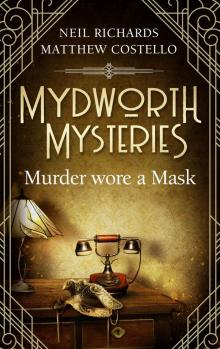 Mydworth Mysteries--Murder wore a Mask
Mydworth Mysteries--Murder wore a Mask Mydworth Mysteries--London Calling!
Mydworth Mysteries--London Calling! Cherringham--Killing Time
Cherringham--Killing Time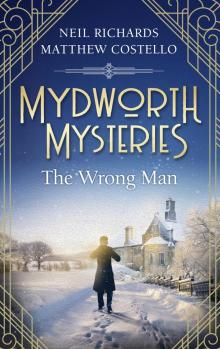 Mydworth Mysteries--The Wrong Man
Mydworth Mysteries--The Wrong Man Cherringham - The Drowned Man
Cherringham - The Drowned Man Cherringham--Killer Track
Cherringham--Killer Track Cherringham--The Secret of Brimley Manor
Cherringham--The Secret of Brimley Manor A Deadly Confession
A Deadly Confession Cherringham--Murder under the Sun
Cherringham--Murder under the Sun Cherringham - A Dinner to Die For
Cherringham - A Dinner to Die For Family
Family Cherringham--Death Trap
Cherringham--Death Trap Cherringham--The Curse of Mabb's Farm
Cherringham--The Curse of Mabb's Farm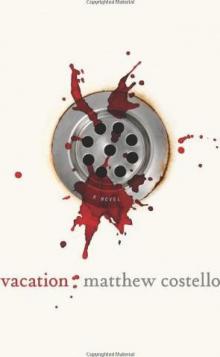 Vacation
Vacation Cherringham--A Bad Lie
Cherringham--A Bad Lie Doom 3™: Worlds on Fire
Doom 3™: Worlds on Fire Cherringham--Scared to Death
Cherringham--Scared to Death Home
Home Dead in the Water
Dead in the Water Star Road
Star Road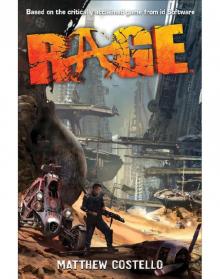 Rage
Rage Cherringham--A Fatal Fall
Cherringham--A Fatal Fall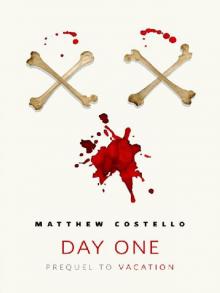 Jack Murphy_Prequel_Day One
Jack Murphy_Prequel_Day One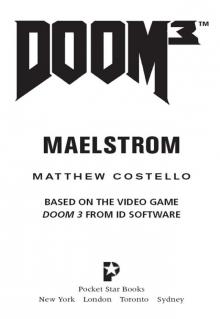 Doom 3™: Maelstrom
Doom 3™: Maelstrom